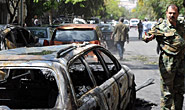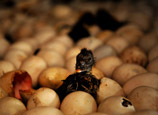
 |
| (The author of the article: Mark Blyth) |
Western Governments are struggling with huge debt burdens. No country, even the USA, can continue to issue debt indefinitely. As we have seen the EU since 2009, eventually the markets get nervous, yields go up So cut we must – right? Sadly, it is not so simple.
There is a natural tendency to equate the financing of a state with the financing of a family. Politicians love to do so. It makes sense and everyone gets it. “Too much debt – stop spending – simple.” Unfortunately the analogy is quite inappropriate and leads to damaging policy. While it is true that when a family spends too much the family must stop spending until income balances expenditures, it is not so simple for a state.
Families do not get to issue their own currency and pay down the debts they owe themselves with that same currency: states do. Families do not get to tax their members back-up the debt that they issue: states do. Families, apart from marriage, do not get to import new members into the family in order to tax them: states do through immigration. Finally, families do not get to issue the global reserve asset: the USAgets to do this. In short, states, especially big states like the USA, are nothing at all like families, so making analogies from family budgets to state budgets leads only to bad policy.
Even if we allow that there are very real limits to how much debt any state can issue and how much money it can print, cutting the state’s budget may not actually lead to less government debt. To see why imagine the economy as a fraction. Make thenumerator the stock of debt and the denominator the size of the economy. Those fractions would give us a state with an 80 percent debt to GDP ratio, typical of a European state today. Now, start cutting the bottom through reductions in public spending. As the government cuts, unemployment goes up, taxes fall, and the revenue needed to pay the debt, along with the economy itself, shrinks. Reciprocally, the debt burden, relative to the size of the economy, just got bigger without the government issuing any more debt.
Have a look at all of those Eurozone countries that have tried to cut their debts since 2009. Latvia and Ireland have undergone the most severe cuts in Europe, but their debt burden relative to the size of the economy has increased.The result across Europe all has been a massive rise in unemployment and a loss of income greater than that caused by the financial crisis itself and more rather than less debt.
What makes this all the more complex is when several states that are each other’s major trading partners and share a currency, like the Eurozone, all try to cut at the same time.
For someone to save they must have income from which to save. So if all the people that you trade with are trying to not spend, then you will have less income from which to save. When everyone tries to save all at once we get into a self-defeating spiral of competitive cutting, which Keynes called the paradox of thrift, where everyone trying to make themselves more solvent makes everyone collectively insolvent. European countries that have managed to escape this fate so far, such as Germany and Finland, are able to do so because their exports rely on sources of demand lie outside their own borders. Countries such as Spain and Italy do not have these options. But even if they did, every country cannot run an export surplus. Like spending and saving, someone has to import for someone else to export. The whole world cannot run a surplus against itself.
Mark Blyth is Professor of International Political Economy in the Department of Political Science at Brown University
Read the Chinese version: 紧缩,没那么简单
Source: People's Daily
We recommend:

World Pillow Fight Day marked in Washington

Multiple mortar shells hit Damascus

Prince William, Kate love sports

Aurora shines in Estonia

Floods kill 46 in Argentina

The world in photos
















 China's weekly story
China's weekly story
(2013.4.8-4.12)


![]()
